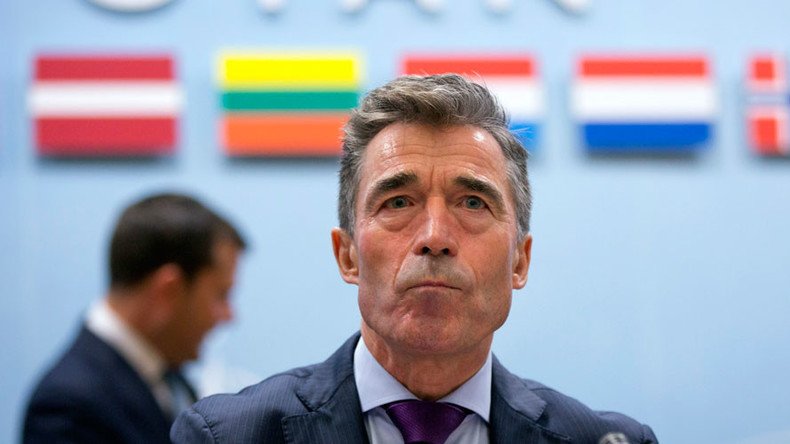Reading through a recent interview with former NATO secretary general Anders Fogh Rasmussen, it becomes clear that his world is one in which US foreign policy has only ever made us all safer and the biggest risk we now face is diminished US power.
The entire premise of his argument throughout the interview is that if the US steps back from playing global policeman, the “bad guys” will win. Simple as that.
Tempting Putin
The interview, which focuses on Donald Trump, opens with a question about Trump’s views regarding the NATO alliance and how the candidate sees the US’s role in the world. Rasmussen immediately declares he is “not taking sides” in the US election, but his attempt at neutrality goes swiftly out the window moments later when he complains that Trump is undermining “the credibility of the United States” and putting at stake America’s “role as the global superpower”. If Trump were to be elected, he laments, that could usher in “the end of the American-led world order”.
This would be very bad, he says, because if NATO is undermined by a Trump victory, then Vladimir Putin would “open a bottle of champagne” and be “tempted to test” the alliance. This assumes that Putin has simply been waiting in the wings for the 16 years that he has held positions of power for Donald Trump to come along so that he can invade Estonia for no reason. Because Rasmussen doesn’t give us a reason and we’re not supposed to ask. We’re just supposed to assume invading the Baltics is on Putin’s to-do list.
So, keeping with his policy of “not taking sides” Rasmussen then argues that Hillary Clinton would be “more determined to defend” the country’s NATO allies than Trump would. When asked whether eastern European nations are worried about Trump’s take-it-or-leave-it approach to NATO’s Article 5 (principle of collective defense) Rasmussen says they are indeed very concerned, particularly following “Russian aggression” against Ukraine. So concerned in fact, that only five of the 28 alliance members have reached the 2 percent of GDP benchmark that NATO requires. Now, this is either because they aren’t really as terrified of Russia as they claim, or that they’re simply taking the US for a ride — in which case, Trump might actually have a point about getting them to cough up before putting American lives in harm’s way to defend them.
It’s hybrid warfare, stupid!
Next up, Rasmussen is asked whether the threat environment for NATO has changed and how the alliance is dealing with the changes. Rasmussen here employs one of my favorite terms: “hybrid warfare”. It’s not just conventional warfare (tanks rolling across borders etc.) that eastern European nations need to be aware of, he says. It’s a whole load of other stuff, too. Like what? Well, sophisticated “disinformation campaigns” for one thing.
But the great thing about “hybrid warfare” is that when you use the term, you don’t really need to explain what you mean. Even NATO itself published an article about the fact that it can mean everything and nothing at the same time. Pretty nifty, right?
Moving on to Crimea, another victim of hybrid warfare. Trump isn’t too bothered by the fact that Crimea was annexed by/invaded by/reunited with Russia in 2014. That’s Europe’s business, he has said — and it shouldn’t prevent Washington and Moscow from getting along and working together on common threats like international terrorism. You don’t have to be a Trump fan to see the common sense in this, but it’s another no-no for Rasmussen.
Trump also hasn’t been so gung-ho about sending weapons to Ukraine. This is very scary and “disturbing” Rasmussen says, because if the US doesn’t support the government in Kiev, the West “risks losing a democratic Ukraine”.
Democracy and world peace
So, how is “democratic Ukraine” doing, then? Well, a few months ago The Guardian published an op-ed arguing that Ukraine was at risk of becoming not a democracy, but a “failed state”. Since the country’s democratic “revolution” in 2013, living standards have plummeted, as has the value of the country’s currency — and the government, ideologically driven to sever all ties with Russia, has pursued economic policies that “can only be termed suicidal”. But the solution is obviously to send them some new weapons. Regardless of whether you believe Russia has acted aggressively in Ukraine or not, this kind of thinking is simply delusional.
Next Rasmussen is asked about Trump’s “America first” campaign slogan, which he also doesn’t happen to like (surprise!). Using the term “America first” for an American presidential election is “out of touch” he says. How so? Well, of course it comes back to America’s role in the world again. You can’t use the term “America first” when you’re supposed to be “the world’s leader”. I swear, I’m not making this up.
After World War 2, Rasmussen tells us, the US established a “rules-based world order” and it has “served us very well” because “freedom has flourished” and we’ve seen “world peace”. All of this freedom and world peace (really?!) is now at stake... because of Donald Trump (are you sensing the “not taking sides” thing?). Anyway, I could list all of the occasions on which the US decided to flout its own “rules-based” order, but that would take too long.
If the US “retreats and retrenches” now, it will create a power vacuum that will be filled by “the bad guy,” Rasmussen warns. He doesn’t tell us who the bad guy is this time; he’s just there, malevolently waiting for Trump’s election. Trump needs to understand that the US has “special obligations” to “maintain world order” and “promote peace”. Not only this, but it’s the “only power on earth” with such a “destiny”.
Barack Obama has also been a disappointment to Rasmussen. He has been “too reluctant” to use American force around the world. Obama and Trump are proponents of a “less interventionist” movement in the world and this simply won’t do.
By the end, Rasmussen had lavished so much praise on the United States and its role and “destiny” in the world that I had forgotten he was not an American himself, but a Dane. The real kicker was when he dramatically pleaded with the next president: “We need a global policeman, and that policeman should be the United States. We don’t have any other.”
Could he really be so profoundly in awe of Washington and its power, or is this waxing lyrical about American destiny simply, as one writer put it, “the practiced gambit of a con man, who knows flattery is the surest means to success” ?
Decide for yourself.
The statements, views and opinions expressed in this column are solely those of the author and do not necessarily represent those of RT.


